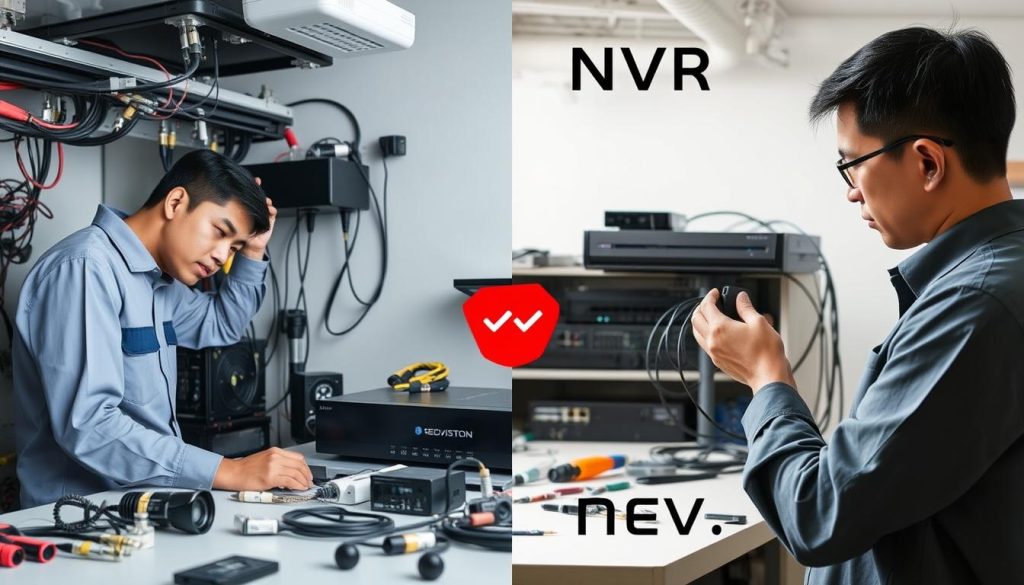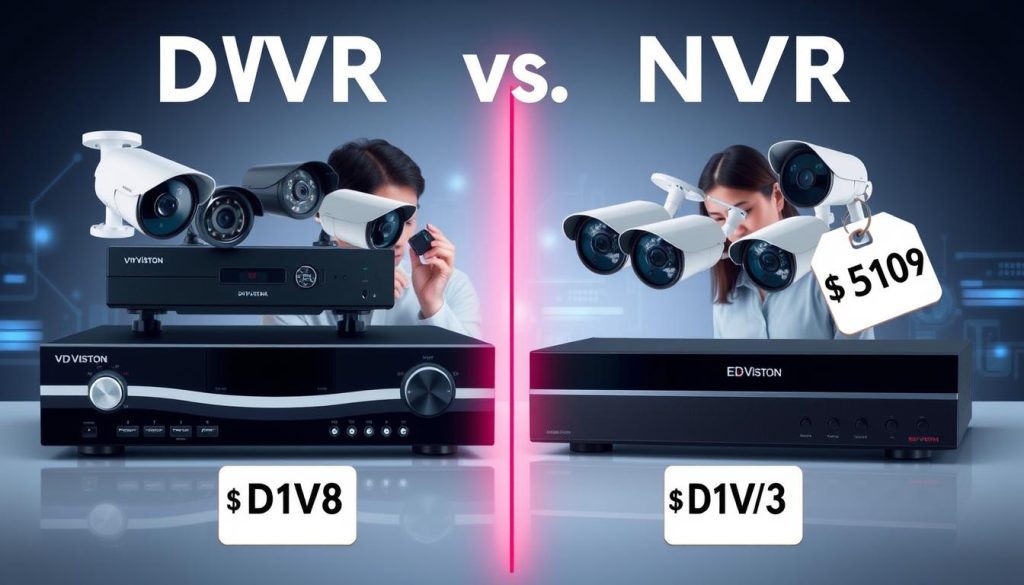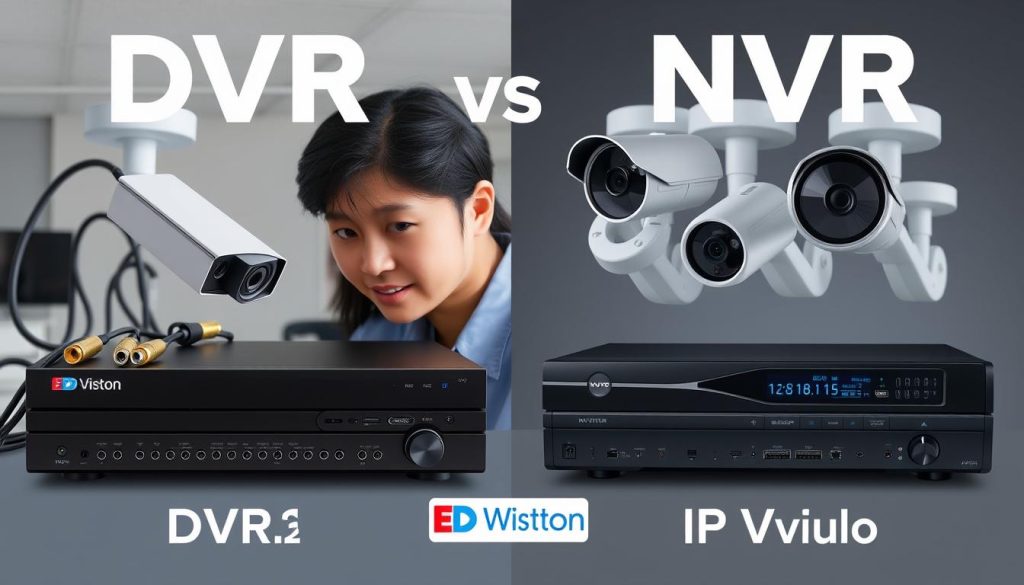Ever wondered why some businesses choose DVR systems and others prefer NVR technology? Knowing the differences between these security options is key to picking the right one. We’ll dive into the main differences between DVR and NVR systems, focusing on their functionality, cost, and tech advancements.
DVR systems use analog cameras, while NVR systems have IP cameras with smart video analytics. NVR systems offer high-resolution video storage and cloud integration, making them popular in Singapore. Yet, their installation, upkeep, and cost can be a puzzle. As you read on, you’ll learn about their hardware, data processing, video quality, and more.
Looking for top-notch security solutions for your surveillance? Don’t wait to contact ED Viston today at +65 8313 4578. Discover the latest CCTV solutions and offers.
Key Takeaways
- The main difference is in the cameras: DVR systems use analog cameras, and NVR systems use IP cameras.
- DVR systems are cheaper, but NVR systems offer better video quality and cloud storage.
- Setting up NVR systems is simpler, thanks to Power over Ethernet technology.
- NVR systems are easier to scale, allowing for adding new cameras as needed.
- NVR systems also offer better remote access, letting you manage footage from anywhere.
Understanding DVR and NVR Systems
DVR and NVR systems have different roles in security. A DVR, or Digital Video Recorder, works with analog cameras. These cameras send video through coaxial cables, leading to lower video quality.
On the other hand, NVR, or Network Video Recorder, connects with digital cameras. It can handle video up to 4K, making it clearer and more detailed. This is key for good surveillance.
Knowing about security systems explained helps in making the right choice. DVR systems are only for wired setups, making them less flexible. NVR systems, though, can be wired or wireless. This makes them easier to set up where needed.
NVR systems also have advanced features like Power over Ethernet (PoE). This makes them better for modern security needs.
More people are choosing NVR systems for better video quality. NVRs offer better image quality and can grow with your needs. They meet the changing security demands while being flexible for users.
Choosing between DVR and NVR systems is important for better security. Customers can call ED Viston at +65 8313 4578 for more information on CCTV solutions in Singapore.
What is the difference between DVR and NVR?
It’s important to know how DVR and NVR systems work to choose the right one. They use different data processing techniques. This affects their performance and what they can do. Many people ask, “What is the difference between DVR and NVR?” when deciding.
Data Processing Techniques
DVR systems turn analog signals into digital footage at the recorder. This method has limits in video quality and features. On the other hand, NVR systems process data at the camera level. They offer better video quality and remote access.
Many think, “DVR or NVR which is better?” The answer is often NVR for its advanced technology and better image quality.
Connected Camera Types
The type of cameras used is a big difference between DVR and NVR. DVR uses analog cameras, while NVR supports IP cameras. IP cameras in NVR systems can reach high resolutions like 5MP or 4K.
NVR systems also use Ethernet cables for installation. This makes setting up easier and supports more cameras without signal loss.
For those looking to improve their surveillance, knowing the differences between DVR and NVR is key. Contact ED Viston today at +65 8313 4578. Learn about the latest CCTV solutions and get advice for your security needs.
Hardware Components of DVR Systems
DVR systems are key in surveillance tech. They use special parts to watch and record. They work well with analog cameras, making it easy to add to existing systems. Knowing the parts of a DVR is key for setting it up right.
Analog Camera Integration
Adding analog cameras to DVRs is easy. These systems support the parts needed for smooth connections. This makes setting up and keeping things running simple.
Many people like using analog cameras because they’re easy to use. Businesses looking for solid security can talk to ED Viston about using analog cameras in their DVRs.
Coaxial Cabling Requirements
Coaxial cables are the usual choice for DVR connections. They send video well but have some downsides. They can’t send audio without extra cables.
Also, long cables can make the video quality drop. Knowing this helps plan better. For longer runs, Ethernet cables might be better, but they have their own limits.
| Feature | DVR Systems | Analog Cameras |
|---|---|---|
| Integration Type | Analog camera integration | Directly compatible with DVR systems |
| Audio Transmission | Requires additional RCA connections | No audio capabilities without additional setup |
| Maximum Cable Length | 500 meters for coaxial | Signal degradation possible beyond this length |
| Cost | Generally lower than NVR systems | Budget-friendly for small applications |
DVR systems are a good choice for those who want value and function. For the newest in CCTV tech and deals, call ED Viston at +65 8313 4578.
Hardware Components of NVR Systems
NVR systems explained use advanced hardware for top-notch video surveillance. They outperform traditional systems, thanks to IP cameras. These cameras bring better performance and functionality.
IP Camera Advantages
IP cameras have many benefits for today’s surveillance needs:
- Enhanced Resolution: IP cameras capture clearer images than analog cameras. This helps in identifying people better in security situations.
- Audio Transmission: IP cameras can send audio along with video. This is a big plus over DVR systems, where cameras can’t send audio.
- Cloud Storage: NVR systems can upload footage to cloud servers. This solves the storage problems of DVR systems. It also boosts data security.
- Intelligent Video Analytics: Advanced IP cameras can recognize faces and license plates. This offers new security options not available with DVR vs NVR hardware.
Wiring and Connectivity Features
Wiring and connectivity are key for NVR systems:
- Ethernet Capabilities: Ethernet cables make installation easier. They carry both power and data in one cable, simplifying wiring.
- Distance Independence: NVR networks don’t lose signal over long distances. This lets you place cameras anywhere without worrying about signal loss.
- Power Over Ethernet (PoE): PoE technology in NVR systems makes installation simple. Cameras get power from the same cable used for data.
- Scalability: Wireless NVR systems can add cameras endlessly. This lets organizations grow their surveillance as needed.
With cybercrime on the rise, strong NVR systems with IP cameras are key for property protection. For the latest CCTV solutions and offers, call ED Viston today at +65 8313 4578.
Comparing Video Quality: DVR vs NVR
It’s important to know the video quality differences between DVR and NVR systems. This helps you choose the right one for your security needs. NVR systems are now the top choice because of their better features.
Resolution Capabilities
NVR systems offer much better resolution than DVR systems. They can start at 2MP and go up to 12MP or more. This means they can capture sharper images and more details, which is key for clear surveillance.
DVR systems have lower resolutions, leading to less clear footage. The video quality comparison shows NVR systems are better for high-definition surveillance. They provide resolutions that improve security efficiency.
Audio Recording Support
Another key point is the audio support in DVR NVR systems. NVRs can record audio natively with built-in microphones. This is great for places where you need to capture sound.
DVR systems can’t do this on their own and need extra wiring for sound. This makes installation harder and limits flexibility. NVR systems’ audio support makes them a complete solution for security monitoring.
If you’re looking for better security options, call ED Viston today at +65 8313 4578. They can help you find the latest CCTV solutions that fit your needs.
Installation Procedures for Each System
When setting up a security system, knowing how to install DVR and NVR systems is key. Each system has its own needs, mainly in cabling. The right setup can greatly affect how well and efficiently it works.
Cabling Differences
DVR systems need a wired setup, mostly using coaxial cables. This can make installations harder, mainly in places without coaxial lines. On the other hand, NVR systems offer more options. They use Cat5e or Cat6a cables, which are easier to install and more flexible. Plus, NVR systems can be set up wirelessly, fitting different settings better.
Here’s a look at how the cabling for DVR and NVR systems differs:
| Feature | DVR Installation | NVR Installation |
|---|---|---|
| Cable Type | Coaxial Cables | Cat5e/Cat6a or Wireless |
| Installation Complexity | More Complex, Without Existing Cabling | Simpler, More Flexible Setup |
| Camera Connection | Limited to Wired Analog Cameras | Supports Both Wired and Wireless IP Cameras |
| Future Proofing | Less Scalable | Highly Scalable with Advanced Features |
| Cost Implications | Lower Initial Costs, but Limited Features | Higher Initial Costs Due to Advanced Technology |
Knowing about these cabling differences helps in choosing the right security system. Both DVR and NVR systems have their benefits and drawbacks. For help picking the best option for you, call ED Viston today at +65 8313 4578. They offer the latest CCTV solutions and deals.

Scalability: DVR NVR Contrast
Scalability is key when choosing surveillance systems. DVR and NVR systems differ in how they grow with your needs. Knowing how each system handles adding cameras is important for making the right choice.
Adding Cameras and System Flexibility
DVR and NVR systems show clear differences in scalability. NVR systems are more flexible, making it easy to add cameras. This is because they work over a network, avoiding the need for complex rewiring.
DVR systems, on the other hand, have limitations. They can only support a certain number of channels, making it hard to expand surveillance. This can be a problem when you need to cover more areas.
Another key point is the setup needed for each system. DVRs use coaxial cables, which can limit where you place cameras. NVRs, using network cables, offer more freedom in camera placement.
NVR systems also support high-resolution cameras, improving image quality as you add more cameras. This is great for big businesses needing detailed surveillance. DVR systems, when expanded, may struggle with resolution and performance, affecting security.
In terms of flexibility, NVR systems are the better choice for growth. They offer advanced features and easy camera integration. This makes it easier for businesses and homeowners to update their security without hassle.
For more on improving your surveillance, contact ED Viston at +65 8313 4578. Learn about the latest CCTV solutions and offers.
Cost Comparison: DVR vs NVR
Choosing between DVR and NVR systems involves looking at the costs. The DVR vs NVR cost factors are key. They affect both the initial cost and the DVR long-term costs that add up over time.
Initial Investment vs Long-term Costs
DVR systems are often cheaper upfront because they use analog cameras. But, this initial savings can lead to higher costs later. This is because DVRs have limited functionality and can’t grow as much as NVRs.
NVR systems cost more at first because of their advanced technology. They support high resolutions like 4K and better frame rates. This makes them better for clear video.
The cost comparison shows that DVR long-term costs can rise due to old storage methods. NVRs, on the other hand, offer more storage and flexibility. They also allow for cloud access, which can add to monthly bills.
Here’s a detailed table comparing the costs of both systems:
| Cost Aspect | DVR System | NVR System |
|---|---|---|
| Initial Investment | Lower cost due to analog cameras | Higher initial cost for IP cameras |
| Long-term Costs | Potentially higher due to limitations | Generally more economical over time |
| Storage Capacity | Limited to internal hard drives | Higher capacity with network-based solutions |
| Scalability | Limited options | Extensive scalability through IP cameras |
| Installation Complexity | Less complex | More complex, requires network setup |
| Video Quality | Up to 1080p | Supports up to 4K resolution |
In summary, DVR systems might seem cheap at first. But, the DVR long-term costs can add up. For the best surveillance solutions, contact ED Viston today at +65 8313 4578. Learn more about the latest CCTV solutions and offers.

Remote Access Features of DVRS and NVRS
The remote access features of surveillance systems greatly affect how users work and respond. Remote access DVR NVR functions show a big difference in performance. NVRs let users access footage from anywhere with an Internet connection. This makes work easier and more efficient, which is great for businesses that need to watch things closely all the time.
DVR systems, on the other hand, have limits when it comes to remote access. They usually need to be accessed in person to manage recordings and settings. This can be a problem for companies that need quick access to surveillance footage. The DVR NVR remote features of NVRs show how modern surveillance tech can meet changing business needs.
Let’s look at some key differences in remote access:
| Feature | DVR | NVR |
|---|---|---|
| Remote Access Capability | Limited, mainly on-location | Flexible, accessible from any Internet-enabled device |
| Ease of Use | Less user-friendly for remote monitoring | User-friendly with mobile app support |
| Video Resolution | Less than 1080p | Up to 4K or higher |
| Dependency on Network | Less dependent on network stability | Highly dependent on network stability |
This comparison shows the big benefits of NVR systems, mainly for companies that value good surveillance access. The need for top-notch monitoring solutions is growing. This means businesses need systems that can grow and work well together.
If you want to improve your surveillance setup, call ED Viston today at +65 8313 4578. Learn more about the latest CCTV solutions and deals.
Conclusion
When choosing between DVR and NVR systems, knowing the differences is key. DVRs are cheaper and work with analog cameras, perfect for those with old setups. On the other hand, NVR systems are better for IP cameras, giving you clearer video and more features like cloud storage.
Thinking about your surveillance system choice involves your budget, how easy it is to install, and if you’ll need more in the future. DVRs are cheaper and stable, but NVRs offer better quality and are easier to use with wireless tech. Hybrid systems are also an option, but they cost more.
Choosing the right system depends on your specific needs. If you’re in Singapore and want to upgrade your security, call ED Viston at +65 8313 4578. They can help you find the best CCTV solutions and offers.
FAQ
What is the primary difference between DVR and NVR systems?
Which system is better for modern security applications, DVR or NVR?
Can you expand on the camera types used with DVR and NVR systems?
How do video quality and resolution compare between DVR and NVR?
What are the cabling requirements for DVR and NVR installations?
How do DVR and NVR systems differ in terms of scalability?
Are there financial differences between choosing DVR and NVR systems?
What remote access features do DVR and NVR systems offer?
Source Links
- https://info.verkada.com/compare/dvr-vs-nvr/
- https://blog.swann.com/dvr-vs-nvr-whats-the-difference/
- https://solink.com/resources/dvr-vs-nvr-which-is-better/
- https://www.nordencommunication.com/en/blog/difference-between-nvr-and-dvr-systems
- https://www.pelco.com/blog/nvr-dvr-guide
- https://www.versitron.com/blogs/post/nvr-or-dvr-which-video-surveillance-system-is-right-for-you?srsltid=AfmBOoritPDI7DiQpETZ4GeLNpGlBD4CFt6-ZZFcY7fI5AuU12-NKEov
- https://www.versitron.com/blogs/post/nvr-or-dvr-which-video-surveillance-system-is-right-for-you?srsltid=AfmBOop11huo7hZbZ8aTCYH3AQ487RXPlmumvbXO57bbLX7u8L3RKjuc
- https://mammothsecurity.com/blog/nvr-vs-dvr
- https://www.versitron.com/blogs/post/nvr-or-dvr-which-video-surveillance-system-is-right-for-you?srsltid=AfmBOoolulrC5fpOO9MaTOEP0Oxmu2RUIEKGKLmpJax_-lH_uK71DQ5F
- https://www.avigilon.com/blog/nvr-vs-dvr
- https://www.nmcabling.co.uk/2021/01/dvr-vs-nvr-whats-the-difference/
- https://www.spot.ai/articles/nvr-vs-dvr
- https://reolink.com/blog/dvr-vs-nvr-which-one-is-better/?srsltid=AfmBOopSHod3fvDW4tZ_wXBJp8wxsF4qxE1rywE8eaolHbxvkgV18ODd
- https://nellyssecurity.com/blogs/articles/whats-the-difference-between-an-nvr-and-a-dvr?srsltid=AfmBOoqEqHQHF1_PVclf5ObaTgxS0CCbBT9ncPkjq7yxiSG7VtPkNeMZ
- https://butterflymx.com/blog/nvr-vs-dvr/
- https://www.coram.ai/post/dvr-vs-nvr-key-difference
- https://www.wss-int.com/dvr-vs-nvr-camera-systems-understanding-the-differences/
- https://impulsecctv.com/blog/choosing-between-nvr-and-dvr-for-your-security-camera-system/
- https://www.linkedsecurityny.com/blog/nvr-vs-dvr-security-systems/
- https://www.versitron.com/blogs/post/nvr-or-dvr-which-video-surveillance-system-is-right-for-you?srsltid=AfmBOopawu_Fq2eSiIIvsKj3Hf0zdDCYG_f9ZK90U2qDdcz7rU_Uel4T
- https://cctvcameravision.com/dvr-vs-nvr-vs-hvr-5-key-differences-explained/
- https://www.dtiq.com/resources/dvr-vs-nvr-whats-the-difference-and-what-do-i-need
- https://www.westerndigital.com/en-in/solutions/cctv/blog/dvr-vs-nvr-video-storage-device-technologies
- https://www.videoexpertsgroup.com/nvr-vs-dvr/
- https://blog.zositech.com/whats-the-difference-between-nvr-and-dvr/
- https://alfred.camera/blog/dvr-vs-nvr/

